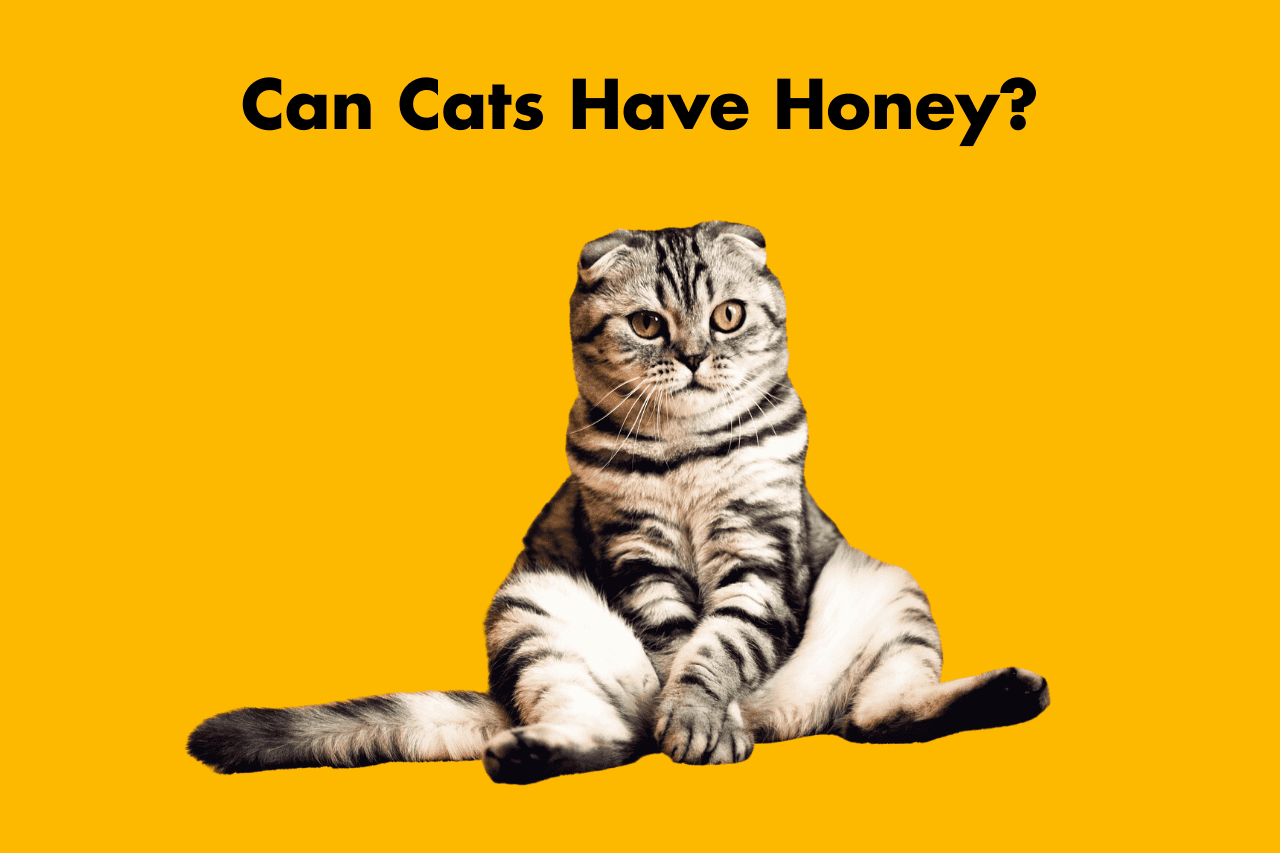Unlike humans, cats cannot taste sweet flavors without an essential gene responsible for detecting sweetness. This genetic difference makes it unlikely that cats can enjoy honey as we do. Additionally, there are some health risks involved. If you’re wondering whether or not your cat can have honey, the short answer is, no, cats should not eat honey.
The Science Behind Feline Taste Buds
Being obligate carnivores, cats rely solely on animal protein for sustenance, and their taste buds have thus adapted accordingly. As a result, their taste buds have evolved differently from ours.
Cats lack an essential gene called Tas1r2 that allows them to detect sweet tastes like those found in honey. While humans possess around 9,000 taste buds capable of tasting various flavors such as sweet, sour, salty, and bitter, cats only have about 470.
How The Carnivorous Nature of Cats Affect Their Sense of Taste
- Amino acids: Cats can taste amino acids, crucial components of proteins found in meat sources.
- Tasting bitterness: Cats’ sensitivity towards bitter compounds is believed to be related to their need to avoid toxic plants while hunting prey.
- Inability to taste sweetness: Since cats don’t require carbohydrates (found in foods like honey) for energy production, unlike omnivores or herbivores, they never developed the ability to detect sweet tastes through evolution.
Considering these factors, it becomes clear that cats’ taste buds are designed explicitly for their carnivorous diet, not for enjoying sweet treats like honey. While cats can eat honey, it is not a necessary part of their diet and should be given in moderation.
Additionally, it is essential to note that while honey isn’t toxic to cats, it lacks the necessary nutrients to make it a healthy addition to a feline friend’s diet. If you want to give your cat a sweet treat, it is best to stick to cat food or other healthy options like manuka honey, which has been shown to have some health benefits for cats when given in moderation.
Honey’s Nutritional Value for Cats
As obligate carnivores, cats require a diet primarily consisting of animal protein. Honey does not provide significant nutritional benefits to support a cat’s dietary needs and may even lead to health problems if consumed in large quantities. In this section, we will explore the essential nutrients in a cat’s natural diet and discuss potential risks associated with feeding honey to cats.
Essential Nutrients Found in a Cat’s Natural Diet
- Amino acids: Cats need various amino acids, such as taurine, which are abundant in meat-based proteins but lacking in honey.
- Fatty acids: Essential fatty acids like arachidonic acid are crucial for maintaining healthy skin and coat conditions. These cannot be obtained from honey.
- Vitamins & minerals: Cats require specific vitamins (like vitamin A) and minerals that can only be sourced from animal products rather than plant-based foods like honey.
Potential Risks Associated with Feeding Honey to Cats
Giving your feline friend sweet treats like honey could cause several issues due to their inability to taste sweetness or properly digest sugars. Some possible concerns include the following:
- Feline diabetes: As mentioned earlier, cats lack an enzyme necessary for regulating blood sugar levels; therefore, consuming excess sugar through honey might increase the risk of developing diabetes.
- Obesity: Honey is high in calories, and feeding it to your cat could lead to weight gain and obesity-related health problems.
- Allergic reactions & digestive issues: Some cats might be allergic or sensitive to specific components of honey, causing adverse reactions like vomiting or diarrhea.
- Botulism: Although a rare risk, botulism can take on allergy-like symptoms at first but then can become very serious. The bacteria can even cause paralysis in cats.
Given these potential risks, avoiding giving honey as a treat for your feline companion is best. Instead, consider offering them cat-friendly alternatives catering to their dietary needs.
Key Takeaway:
Cats are obligate carnivores and require a diet primarily consisting of animal protein, which honey does not provide. Feeding cats honey could lead to health problems such as diabetes, obesity, allergies, and digestive issues due to their inability to taste sweetness or properly digest sugars. It’s best to avoid giving honey as a treat for your feline companion and offer them cat-friendly alternatives that cater to their dietary needs.
Blood Sugar Regulation in Cats
Cats lack an enzyme called glucokinase, which is crucial for regulating blood sugar levels. Without glucokinase, cats have difficulty metabolizing the sugars in honey, which could lead to irregular blood sugar levels. Feeding your cat honey could cause various health issues, such as diabetes or obesity.
The Role of Glucokinase in Controlling Blood Sugar Levels
Glucokinase is vital in breaking down glucose and maintaining stable blood sugar levels. In humans and other animals, this enzyme helps convert excess glucose into glycogen for storage when needed later on. However, cats’ bodies are not designed to handle high amounts of carbohydrates like those found in honey due to their carnivorous nature.
Health Risks Related to Unregulated Blood Sugar Consumption
- Diabetes: Prolonged exposure to high amounts of sugar can lead cats to develop feline diabetes. Diabetic cats require lifelong treatment and monitoring by veterinarians.
- Obesity: Excess calories from sweet treats like honey can contribute significantly toward weight gain, increasing the risk of obesity-related health problems like heart disease or arthritis.
- Digestive Issues: Honey may also disrupt your feline friend’s digestive system since they are not accustomed to processing large quantities of sugars.
Providing a nutritious diet for your pet is key to their well-being, emphasizing proteins and avoiding unneeded sugar. By doing so, you can help to promote their well-being and longevity.
Toxicity Concerns with Bees and Honey
While honey isn’t toxic to cats, it’s essential to be aware that some bees produce toxic honey. This type of honey contains compounds that can be harmful when ingested by animals like cats. Since felines cannot taste the sweetness and detect the presence of these toxins through their taste buds, they are at risk if exposed unknowingly.
Types of Toxic Substances Found in Honey Types
- Grayanotoxins: These toxins are found in certain kinds of honey from nectar collected from plants like rhododendrons. Grayanotoxins may lead to signs such as nausea, lightheadedness, and even cardiac issues in both people and animals.
- Harmful bacteria: Raw or unprocessed honey may contain harmful bacteria like Clostridium botulinum spores which can lead to serious health issues for your cat.
Symptoms and Dangers Posed by Consuming Toxic Honey
If your cat accidentally consumes toxic honey, you might observe signs such as drooling, difficulty breathing, weakness or lethargy, vomiting, or diarrhea. Seizures, comas, or even death could occur in severe grayanotoxin poisoning cases.
If you suspect your cat has consumed toxic honey or is displaying any concerning symptoms after eating any human food product, including raw manuka honey, contact a veterinarian immediately for advice and treatment.
Alternatives Treats for Your Feline Friend
While sharing human food treats like honey with your furry companion might be tempting, healthier alternatives are specifically designed for felines’ unique dietary requirements. You and your pet can be content without compromising their health with alternative treats.
Cat-friendly treat options
- Commercial cat treats: These are specially formulated to meet the nutritional needs of cats while providing a tasty snack. Look for high-quality ingredients and avoid those containing artificial additives or excessive sugar.
- Fresh meat: Small pieces of cooked chicken, turkey, or fish can serve as a delicious treat that provides essential amino acids and protein required by your feline friend’s digestive system.
- Catnip: Although not technically a “treat,” many cats enjoy the stimulating effects of catnip. Sprinkle some on their favorite toy or scratching post for added enjoyment.
Tips for selecting the best treats for your cat’s health
- Avoid feeding honey-roasted peanuts, as they contain sweeteners that may harm diabetic cats.
- If you’re considering giving raw manuka honey or unprocessed honey to help soothe sore throats in healthy cats, consult with your veterinarian first to ensure it is safe and appropriate for your specific pet’s needs.
- Moderation is vital when offering any treat; overindulging can lead to obesity and other health issues in feline friends who cannot taste sweetness but still crave attention from their humans.
FAQs about Cats Taste Honey
Can Cats Taste Honey?
Cats have a limited ability to taste sweetness due to their carnivorous nature. While they may be able to detect some flavors in honey, it is not as appealing or enjoyable for them as it is for humans. Their sense of taste focuses more on proteins and amino acids.
Can Cats Eat Things with Honey?
Cats can consume small amounts of honey without immediate harm, but it should not be a regular diet. Honey lacks essential nutrients that cats need and may contribute to obesity and dental issues if consumed frequently. Always consult your veterinarian before introducing new foods into your cat’s diet.
Is Raw Honey Toxic to Cats?
Raw honey itself is not inherently toxic to cats; however, certain types of honey can contain toxins, such as grayanotoxins found in rhododendron honey. When ingested, these toxins can cause serious health issues in both pets and humans.
Can I Give My Cat Honey for a Cough?
Honey should not be used as a remedy for feline coughs since there are no proven benefits specifically for this purpose in cats. If your cat has persistent coughing symptoms, consult your veterinarian about appropriate treatments for feline respiratory health.
Conclusion
Despite cats’ potential fondness for honey, it is essential to be careful when providing it as part of their diet. Honey lacks essential nutrients in a cat’s natural diet and can pose health risks if consumed excessively or if toxic substances are present. As with any treat or addition to your cat’s diet, moderation is key.
If you’re searching for different snacks to offer your cat, plenty of products have been created explicitly with their dietary requirements in mind. Consider consulting with a veterinarian or researching reputable brands before changing your cat’s diet.
Interested in learning more about beekeeping and honey production? Check out Honey Bee Hobbyist, where you can find resources and supplies for starting your hobby apiary!

